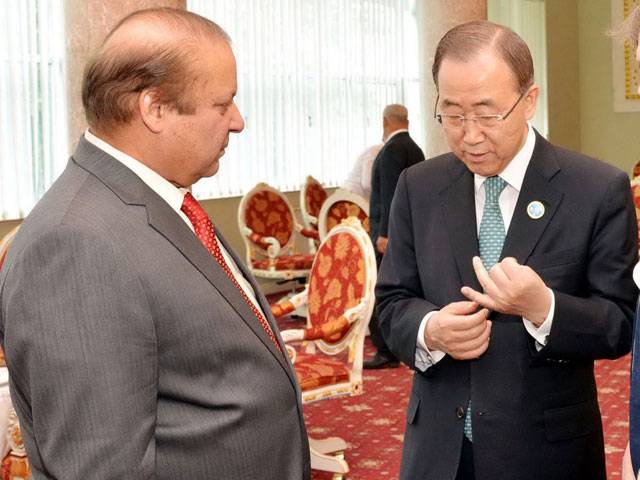AGENCIES/SPECIAL CORRESPONDENT
DUSHANBE/NEW YORK - Prime Minister Nawaz Sharif has called for implementation of the United Nations resolutions on Kashmir, urging the world body to play its role on the issue.
Talking to UN Secretary General Ban Ki-moon in Tajik capital on Tuesday, the prime minister said the UN must get its resolutions on Kashmir implemented because it was the duty of the Security Council.
About Pakistan-India relations, the prime minister said there appeared to be no acknowledgement of the initiatives Pakistan had taken to promote dialogue between the two countries. In fact, the recent statements by the Indian leadership were deeply disappointing, he said.
Indian Prime Minister Narendra Modi, while speaking at Dhaka University the other day, accused Pakistan of promoting terrorism in the region. He also alleged Pakistan was creating obstacles in the Saarc connectivity.
Nawaz Sharif told Ban Ki-moon that India did not respond positively to Pakistan’s attempt to restore negotiations. He said cordial relations with the neighbouring countries had always been the cornerstone of Pakistan’s foreign policy.
The prime minister told Ban Ki-moon that Pakistan had a strong and steadfast relationship with the UN and appreciated his leadership in advancing key objectives of peace and development.
A UN spokesman told the regular noon briefing at New York that Secretary-General Ban Ki-moon underscored the need for improving relations between India and Pakistan in his meeting with Prime Minister Nawaz Sharif in Dushanbe.
“The secretary general and the prime minister also discussed relations among the countries in the region, including Afghanistan and Central Asian countries,” UN Spokesman Stephane Dujarric said. “The secretary general emphasised the need for improved relations between Pakistan and India,” he added.
Asked whether the Kashmir dispute figured in the talks, the spokesman said the two leaders talked about a range of issues between the two neighbours. “On the issue of countering terrorism, the secretary general stressed the importance of addressing root causes,” the spokesman stated.
About other issues, Nawaz Sharif said Pakistan, being among the top contributors to the United Nations’ peacekeeping operations, would continue to respond to calls for peacekeeping. He said Pakistan had formulated its 20-point National Action Plan, adopting a policy of zero tolerance and unflinching dedication towards countering the menace of terrorism.
Staff Reporter from Islamabad adds: Taking serious view of Indian Prime Minister Narendra Modi’s statement about involvement of his country in East Pakistan, Islamabad Tuesday termed it regrettable, saying these statements had endorsed its stance regarding India’s negative role against Pakistan.
“Prime Minister Narendra Modi’s admission of Indian involvement in the events of 1971 in the then East Pakistan confirms Pakistan’s stance on India’s negative role against a sovereign neighbouring state,” Foreign Office Spokesperson Qazi Khalilullah said in a statement.
He called upon the international community to take notice of India’s acknowledgement of its interference in East Pakistan. The spokesperson said it was regrettable that the Indian politicians not only indulged in actions that were in violation of the United Nations’ Charter but also took pride in recalling their interference in the internal affairs of other states.
The spokesperson reiterated that the people of Pakistan and Bangladesh were bound not only by the strong bonds of religious affinity but also by the history of their struggle for independence against colonial rule. He said Indian attempts to sow seeds of discord between the two brotherly nations would not succeed.
With reference to Modi’s allegations against Pakistan at Dhaka University, the spokesperson asserted Pakistan believed in peaceful co-existence and having good neighbourly relations with India, but characterisation of bilateral relations by the Indian prime minister as ‘nuisance’ was unfortunate.
Pakistan’s response came after much criticism from politicians on the Indian premier’s allegations at Dhaka University. Earlier on Tuesday, Leader of Opposition Khursheed Shah, while addressing the National Assembly, said the Foreign Office should take notice of Modi’s statements against Pakistan. Shah said Modi’s statements against the country were extremely condemnable, adding Pakistan had always tried to maintain good relations with its neighbouring countries.
The leader of the opposition asserted Pakistan had offered much more scarifies in its war against terrorism and other challenges than India. “I admit that India is a big county, but we are also an autonomous power,” he said.
Indian Prime Minister Modi, during his two-day visit to Bangladesh, accused Pakistan of creating ‘nuisance’ and ‘constantly’ troubling India by promoting terrorism. “Pakistan constantly disturbs India, creates nuisance and stokes terrorism,” Modi said in his address in Hindi to the Dhaka University students.
Friday, April 26, 2024
Modi’s Dhaka speech disappointing: Nawaz
| Asks UN to implement Security Council resolutions on Kashmir | FO wants world to take notice of Indian PM’s confession about interference in East Pakistan

12:26 AM | April 26, 2024
12:25 AM | April 26, 2024
12:24 AM | April 26, 2024
Musk vs Australia
April 25, 2024
Reforming Rehab
April 25, 2024
Tax It Right
April 25, 2024
Academic Uprising
April 24, 2024
Cooperation Momentum
April 24, 2024
Ending animal suffering
April 25, 2024
AI governance
April 25, 2024
AI concerns
April 25, 2024
Population paradox
April 24, 2024
Unveiling differences
April 24, 2024
ePaper - Nawaiwaqt
Advertisement
Nawaiwaqt Group | Copyright © 2024





